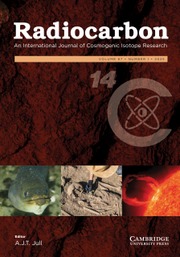Dear readers,
Because of the growing Latin American radiocarbon community and the need for reaching global standards in their research, we were compelled to establish a specific event that aims to bring together researchers from Latin America and representatives of the radiocarbon community from all over the world.
The first Latin-American Radiocarbon Conference took place from July 29th to August 2nd, 2019, in the city of Niterói, in Rio de Janeiro, Brazil.
The event was extremely successful, fulfilling all its objectives. Researchers from several countries in the world were present, such as Belgium, Austria, Poland, United States, and Australia, among others. From Latin America there were researchers from Argentina, Chile, Colombia, Mexico, and Brazil. The five days of activities included talks, poster presentations, a visit to the Physics Institute laboratories, excursions to the Sugar Loaf and an archaeological site museum in the city of Rio das Ostras, ending in a student’s workshop.
Researchers from different Latin American countries had the opportunity to interact, fostering new collaborations. Both undergraduate and graduate students had the chance to present their work to important researchers in the field of radiocarbon.
Only 13 kilometers separate the beauties of Niterói from the Wonderful City. The beautiful view of one of the biggest tourist attractions, Rio de Janeiro, would be reason alone to visit Niterói. However, Niterói is much more. The Contemporary Art Museum (MAC), the Niemeyer Path, the Fort’s Complex, the well-known Fish Market, the Fashion Pole, and the diversified commerce and gastronomy of excellence all point to Niterói as a tourist destination of relevance in the national scenario. A mid-conference lunch took place in the À Mineira restaurant with typical Brazilian food and the Conference dinner was held at the MAC museum, with a Samba music group playing and with artisanal beer and caipirinhas served.
We are extremely grateful to our sponsors, who made the First CLARa possible! Special thanks to photographer Bruna Vitorino, logo designer Stephany Chanca, event coordinator Alessandra Leitão, all members of the scientific committee, all members of the organizing committee plus the guest member Giovanna Damasio and all the volunteers! Very special thanks to Kim Tanner Elliott and Tim Jull, for their support and dedication to this special issue of Radiocarbon.
We dedicate the first CLARa to the memory of Professor Paulo Gomes (1950–2016), who made it possible to install LAC-UFF, the first 14C-AMS facility in Latin America.
We hope to see you all at the 2nd Latin American Radiocarbon Conference (CLARa) 2023, which will be organized by the AMS Laboratory (LEMA) of the Institute of Physics of the National Autonomous University of Mexico, in the mythical Historical Center of Mexico City.
Supplementary material
To view supplementary material for this article, please visit https://doi.org/10.1017/RDC.2021.64
SCIENTIFIC COMMITTEE
Kita Macario – UFF – Brazil
Corina Solis – UNAM – Mexico
Carla Carvalho - UFF – Brazil
Maikel Diaz – UH – Cuba
Luiz Carlos Pessenda – USP – Brazil
Marcelo Cohen – UFPA – Brazil
Carlos Appoloni – UEL – Brazil
Maria Zucchi – UFBA – Brazil
Andres Arazi – CNEA – Argentina
Carlos Sierra – MPI-BGC – Germany
Timothy Jull – Arizona University – USA
Thomas Higham – Oxford University – UK
Evelyn Keaveney – Queen’s University Belfast – UK
Walter Kutschera – Vienna University – Austria
Guaciara Santos – University of California – USA
Cristine Hatte – Gif-sur-Yvette – France
Stewart Fallon – ANU – Australia
Philippa Ascough – University of Glasgow – UK
Quan Hua – ANSTO – Australia
Ricardo Fernandes – MPI-SHH – Germany
Jesper Olsen – Aarhus University – Denmark
Mike Dee – University of Groningen – Netherlands
Fidel Roig – CONICET- Argentina
ORGANIZING COMMITTEE
Kita Macario – UFF – Brazil
Corina Solis – UNAM – Mexico
Carla Carvalho – UFF – Brazil
Fabiana Oliveira – UFF – Brazil
Maikel Diaz – UH – Cuba
Luiz Carlos Pessenda – USP – Brazil
Marcelo Cohen – UFPA – Brazil
Carlos Appoloni – UEL – Brazil
Maria Zucchi – UFBA – Brazil
Andres Arazi – CNEA – Argentina
Timothy Jull – University of Arizona – USA
and ICER – Hungary
Roberto Meigikos - UFF – Brazil
Ingrid Chanca – MPI-BGC/UFF – Brazil
Eduardo Alves – Oxford/UFF – Brazil
(guest member: Giovanna Damasio)

In 2012 a 250 kV Single Stage Accelerator System was installed at the LAC-UFF, completing the first 14C-AMS facility in Latin America.


The Radiocarbon Laboratory of the Fluminense Federal University was installed in 2009 as a sample preparation laboratory. Pictured is Professor Kita Macario building our first graphitization line.
Professors Paulo Gomes and Carla Carvalho, NEC experts Mike Mores and Kenny Kearney with Fabiana Oliveira, Maikel Diaz and Eduardo Alves (then students beginning to work with AMS).
CLARa is an opportunity for the international radiocarbon community to embrace its Latin American colleagues, through a series of talks and discussions, contributing to the development of a solid network of collaborators working in the most diverse themes and applications of the technique.


After 10 years of scientific research more than 30 students have learned to work with 14C-AMS at LAC-UFF.


Attendees of the 2019 CLARa meeting held in Niterói, RJ, Brazil.



